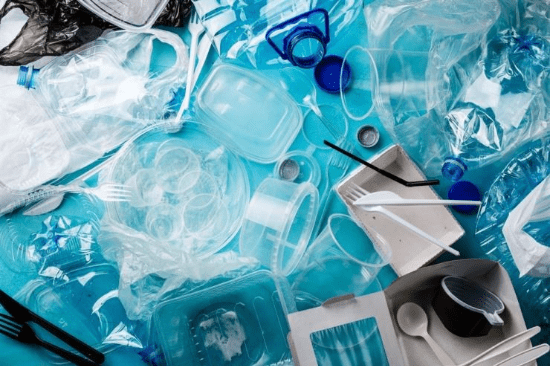Businesses will no longer be able to supply single-use plastics. [UK government]
An all-in deposit return scheme and the extended producer responsibility policy have been postponed. [UK government]
.
Turn Lyme Green has got some good news to share:
| Hooray! It’s taken a few years, but from October 1st businesses will no longer be able to supply: ● plastic cutlery (such as forks, knives, spoons and chopsticks); ● plastic plates; ● plastic trays; ● plastic bowls; ● expanded and extruded polystyrene food containers; and ● expanded and extruded polystyrene beverage containers, including cups. But the ban on the supply of single-use plastic plates, trays and bowls will not apply to those that are used as packaging in shelf-ready pre-packaged food items. So pre-packaged salads and suchlike may still be in plastic bowls. Luckily we don’t have many shops in Lyme that pre-package takeaway foods. The ban will cover items made from plastic that is bio-based, biodegradable or compostable. This is good because for a number of years we had been saying that such products were just as bad and potentially worse as oil based plastics (they don’t decompose in normal landfill and take agricultural land out of food production.) Sadly drinks will still be served in single use plastic bottles ……. |

The government’s own guidance states that from 1 October 2023 businesses must no longer supply, sell or offer certain single-use plastic items in England.
And meanwhile, the supermarket plastic bag charge has led to a 98% drop in use in England – although there is criticism that other measures have been delayed, as reported in the Guardian:
Nina Schrank, the head of Greenpeace UK’s plastic campaign, said: “The success of the plastic bag charge shows that when the government takes real action it gets results and the public gets on board. It’s ironic then for these figures to come out just as ministers are busy delaying vital plans to tackle the scourge of single-use plastic.
“Both the deposit return scheme and new rules to make plastic producers contribute to clean-up costs, which formed the key planks of the government’s waste strategy, have been delayed until 2025. Instead of letting plastic polluters off the hook, ministers should bring in legally binding targets to force companies to turn off the plastic waste tap at the source.
“This is just one small step in a much longer journey to tackle plastic pollution. To be considered global leaders in tackling plastic pollution they need to be setting themselves reduction, refill and reuse targets and they also need to be implementing their own policies, such as an all-in deposit return scheme, like they promised in their 2015 manifesto, and the long-awaited extended producer responsibility policy.”